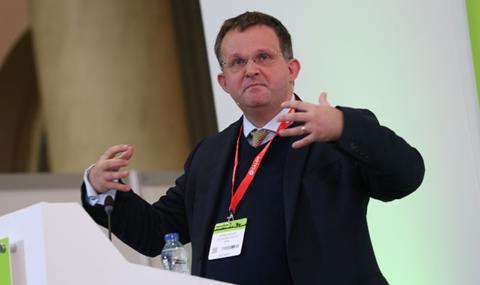
Speakers at this year’s Freight in the City Expo have urged politicians to give haulers much clearer guidelines on the part the sector should play in a zero emissions future.
The event, held at London’s Alexandra Palace on 6 November, saw RHA head of policy, environment and regulation Chris Ashley (above) call on the incoming government to reduce the “ambiguity” around its advice and instead offer a “tangible timetable” on how hauliers can play their part.
“We are facing an immense amount of emotion, pressure and noise being created by environmental activists,” Ashley said. “We want to channel that emotion to give positive benefits, but the challenge is how we get there in a way that sustains the industry, employment and the environment.”
He went on to claim that “where emotion and reaction meet it can lead to bad policy making”.
“In the case of CAZ, a blanket approach to charging - punitive charges - is not the way forward,” he said. “For CAZ policy to work it needs to target and address the exact sources of the poor air quality with a much more nuanced and intelligent approach, recognising emission trends coming from pre-Euro-6 lorries.
“But my challenge to politicians from a haulage perspective is that there’s a lack of structure to inform the way forward, particularly for lorries. There are warm words about a net zero future but what’s missing is a tangible timetable on how hauliers can play their part in it.”
Ashley described conversations about future fuel technology as “exciting but uncertain with big questions remaining on how it will be achieved and when”.
“A lot will rest on the incoming government,” he admitted. “It seems clear that the parties are signed up to net zero emissions so the RHA is asking the incoming government to give us a very clear roadmap that empowers our sector to achieve that. We need clear milestones.
“We hear about lofty aspirations to bring forward the date of getting rid of diesel cars to 2030, but that’s only 10 years away. Does this apply to lorries? Nobody knows. And what will replace the existing fossil fuel powered vehicles? The list of alternative fuels is long and the investment required is involved and expensive. Decisions need to be made on the infrastructure, tax and regulatory framework.
“Will the incoming government allow market forces to determine the way forward in terms of tomorrow’s fuel or will there be state intervention? There are very few answers to the questions.”
Meanwhile, in a keynote address, Dominic Phinn, business engagement, clean air at Client Earth agreed that although positive trends were emerging towards zero emissions, there was “no detail from government on how to get there”.
“There isn’t a joined up approach,” he said. “It needs more funding, billions not millions. We have better charging infrastructure so I’m optimistic but barriers remain.”
Ashely said the RHA would approach the situation by framing any debate in terms of environmental, economic and social factors, which he said would “avoid the noise and give policy makers a framework”.
“We want to place the end user at the heart of the solution,” he explained. “Basically we want to work the problem from the ordinary businesses perspective, so they own the decisions that need to be made rather than have them imposed through a heated encounter.”
The RHA approach, he concluded, would be one of “eliminate, minimise and offset”.
“Where we can we’ll eliminate carbon emissions from freight and logistics, but where that is not practical we’ll minimise emissions and offset what we can’t eliminate.”











